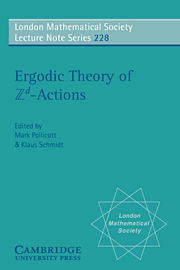Book contents
- Frontmatter
- Contents
- Introduction
- Surveys
- 1 Ergodic Ramsey Theory
- 2 Flows on homogeneous spaces
- 3 The variational principle for Hausdorff dimension
- 4 Boundaries of invariant Markov Operators: The identification problem
- 5 Squaring and cubing the circle – Rudolph's theorem
- 6 A survey of recent K-theoretic invariants for dynamical systems
- 7 Miles of Tiles
- 8 Overlapping cylinders: the size of a dynamically defined Cantor-set
- Research Papers
7 - Miles of Tiles
Published online by Cambridge University Press: 30 March 2010
- Frontmatter
- Contents
- Introduction
- Surveys
- 1 Ergodic Ramsey Theory
- 2 Flows on homogeneous spaces
- 3 The variational principle for Hausdorff dimension
- 4 Boundaries of invariant Markov Operators: The identification problem
- 5 Squaring and cubing the circle – Rudolph's theorem
- 6 A survey of recent K-theoretic invariants for dynamical systems
- 7 Miles of Tiles
- 8 Overlapping cylinders: the size of a dynamically defined Cantor-set
- Research Papers
Summary
Introduction. This article corresponds closely to four lectures given in conjunction with the July 1994 workshop at Warwick; the informal format of those lectures is maintained.
Our main goal is to discuss the generalization of subshifts with Zd actions, especially those of finite-type, to tiling systems with Rd actions. Our justification for this generalization is the natural action of the Euclidean group, in particular rotations, on tiling systems. The new “statistical” form of rotational symmetries which appear are a significant addition to the mathematics of subshifts, and of decided value in applications, which we discuss.
There are four sections to this article. We begin slowly, warming up within the familiar context of subshifts. The two themes in section I) are first the contrast between subshifts of finite-type and substitution subshifts, and second the entropy of uniquely ergodic subshifts of finite-type. Sections II) and III) generalize the subject in two ways. In II) we make the leap from subshifts to tiling systems, and discuss further the connection between finite-type and substitution systems. The main examples used for illustration are the pinwheel and Penrose tilings of the plane; see Figures 1 and 2.
Section III) is devoted to the use of intuition from physics (statistical mechanics) to finite-type systems, and in particular leads into the subject of rotational symmetries in such systems. All the previous discussion becomes focused in section IV) with a discussion of statistical symmetries and their use in ergodic theory and in the analysis of patterns in space.
- Type
- Chapter
- Information
- Ergodic Theory and Zd Actions , pp. 237 - 258Publisher: Cambridge University PressPrint publication year: 1996

